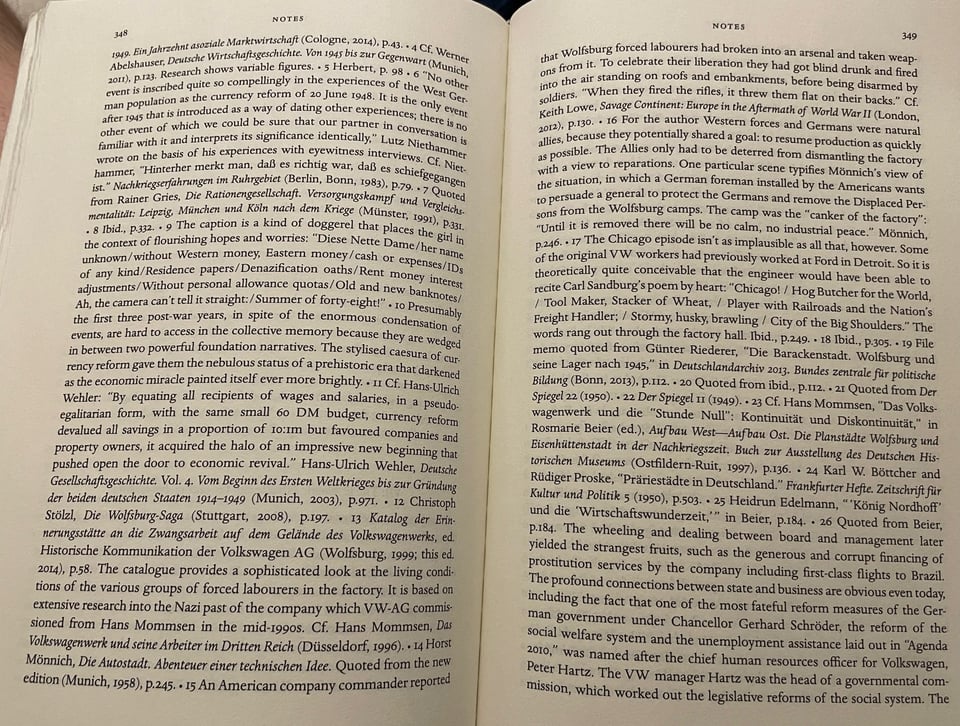Book Time #1: Ivy League admissions, lead poisoning, Germany after the Nazis

Welcome to Book Time, a newsletter with book recommendations focused on history and cities, by Aaron Gordon. You're receiving this email because you subscribed to my previous newsletter or you signed up to receive Book Time. Thanks so much for being a part of this new project!
I'm working on creating an easily searchable/browseable database of my recommendations, but for now, I've created some lists on Bookshop:
Big books (500+ pages) that I think are worth the time and effort, which I call Doorstops Worth Their Weight in Gold
And generally excellent books that get an enthusiastic hell yeah
These do not include every book I've ever read and liked, mostly because I only started tracking my books in 2019. But, like today's edition, it's a start. If you see any glaring omissions, let me know by replying to this email.
Now, it's book time.
The Chosen: The Hidden History of Admission and Exclusion at Harvard, Yale, and Princeton, Jerome Karabel
In my junior year of high school, I volunteered to build a fence for a local church so I could put "Helped Build Fence For Local Church" on the extracurricular section of my college applications. I can't imagine any admissions officer gave a shit. But I felt I had to, because prioritizing "well-rounded" applicants is a staple of college applications for schools around the country.
This idea that college students should be "well-rounded" started roughly a century ago at Harvard, Yale, and particularly Princeton, for the explicit purpose of limiting the number of Jewish students. In fact, most everything about the modern college application system originates from a time when the Ivys needed to devise new and novel ways of keeping academically gifted Jews out.
The Chosen has a lot to say about anti-semitism, since it was a major focus of admissions regimes at the Big Three. But The Chosen is much more than that. It's the rare kind of book I can't stop talking or thinking about because it has changed the way I view privilege in America. We all know Harvard, Yale, and Princeton are bastions of privilege. What this book demonstrates through careful research and purposeful writing is far more sophisticated.
The book was written in 2005 but is newly relevant given the recent Supreme Court ruling on affirmative action at Harvard. The Chosen's most biting insight is that privilege is about more than than how it passes from generation to generation. It is about the architecture built around the system of privilege to shield each new generation from the realization that they have it. [Buy on Bookshop.]
Lead Wars: The Politics of Science and the Fate of America's Children, David Rosner and Gerald Markowitz
An overview of the science and public health policy debates surrounding lead poisoning, particularly the ethics of conducting studies on families that potentially expose young children to even more lead. This is very much an academic work. At several points the authors reference another book called Toxic Truth, a narrative of a single doctor up against the lead-industrial complex that may be snappier (but I haven't read). Although the authors draw comparisons to parallel histories of asbestos and cigarettes, those familiar with the auto industry’s history of fighting regulations to make cars safer will recognize this trajectory. I do recommend this book despite finding myself wanting to have learned a lot more about industry efforts to cast doubt on the very clear science that lead is poison. [Buy on Bookshop.]
Related: Moving Violations: Automobiles, Experts, and Regulations in the United States, Lee Vinsel // There Are No Accidents, Jessie Singer
Aftermath: Life in the Fallout of the Third Reich, 1945-1955, Harald Jähner
Why are the years immediately following big wars generally absent from history textbooks and neglected by historians? Jähner, who is a journalist by trade—don't hold it against him—thinks it is because in the postwar power vacuum historians "lack an institutional subject."
Aftermath is social history at its best, elegantly written (and translated by Shaun Whiteside) with moral clarity but also empathy, two historical medicines that all too often aren't prescribed in equal proportion. You won't find extended passages on the logistics of the Berlin airlift or the bureaucratic hurdles of re-launching urban transit systems (although I, and maybe nobody else, would read the hell out of that book). Instead, you'll find an entire chapter on dancing and nightlife, another on food requisition and the black market, a third largely about the mass rape of German women by Soviet soldiers that basically nobody talked about for decades. Aftermath, like the period it covers, can be funny in one moment and unconscionably grotesque the next. [Buy on Bookshop.]
However, I am going to shame the publisher (Vintage, a division of Penguin Random House) for the worst endnote structure I've ever come across. A solid block of text with no paragraph breaks, page headings, or wayfinding of any kind. Actively hostile to anyone who wants to look up the sourcing. Shame on you, Vintage.

Related: Embracing Defeat: Japan in the Wake of World War II, John Dower // American Midnight: The Great War, a Violent Peace, and Democracy's Forgotten Crisis, Adam Hochschild // Reconstruction: America's Unfinished Revolution, 1863-1877, Eric Foner